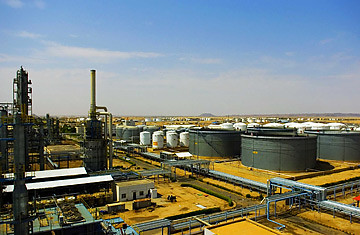
Sudan oil refinery where the newly-emerging oil-rich central African state has been under fire from U.S. imperialism for years. The leadership of the country is being hounded by the ICC which it is not a party to the Rome Statute., a photo by Pan-African News Wire File Photos on Flickr.
South Sudan urges Sudan to keep security pact
By RODNEY MUHUMUZA | Associated Press
KAMPALA, Uganda (AP) — Sudan's threat to shut down South Sudan's oil exports over its alleged support for rebels in Sudan will not spark a return to armed hostility as long as Sudan respects a security agreement reached earlier this year, a South Sudanese military official said Monday.
South Sudanese army spokesman Col. Philip Aguer said, however, that any violations of an African Union-mediated pact signed in March would be taken as an act of provocation.
"The oil can be shut down," he said from Juba, South Sudan's capital. "What may amount to a declaration of war is if the security agreements that have been reached are violated. Oil is just a bilateral agreement which the Sudanese government has the choice to accept or not to accept."
Aguer said Sudan had yet to implement President Omar al-Bashir's recent order to close pipelines carrying South Sudan's oil exports over charges the government in Juba supports armed rebels seeking to topple the Sudan's government. Mohammed Atta al-Moula, Sudan's spy chief, told reporters on Sunday that the country also will suspend its security and economic pacts with South Sudan if the country does not end its alleged support for rebels who recently have mounted attacks on the Sudanese army.
Jen Psaki, a spokeswoman for the U.S. State Department, told reporters in Washington that Sudan's threat to shut down oil pipelines "is deeply disappointing."
She said implementing this threat would be a "violation of Sudan's obligations under the September 27th agreements, which only allow for a shutdown with 60 days of notice for economic or technical reasons ..."
South Sudan —which also accuses Sudan of supporting a rebel group led by a former South Sudanese army colonel named David Yau Yau —denies backing Sudan People's Liberation Movement-North, or SPLM-N, rebels.
"We are not helping any rebels," Aguer said.
"The allegations are baseless. It's just because they have been unable to defeat the rebels that they are looking for an explanation elsewhere."
But Small Arms Survey, an independent Swiss research firm, said in a report in April that South Sudan provided logistical, financial and political support, but not weapons, to rebels fighting the Sudanese military. The group said South Sudan's government is providing vehicles, fuel and food to SPLM-N fighters and other rebel groups. The SPLM-N operates on the Sudan side of the border between the two countries but is ideologically aligned with South Sudan.
South Sudan, which gained independence from Sudan in 2011 after decades of civil war, pumps its crude exports through pipelines that run through Sudan. In early 2012 South Sudan charged that Sudan was stealing its oil and then shut down its oil industry, a decision that crippled the government budgets of both countries.
Since their 2011 division there has been fighting between the two countries, and threats to resume hostilities. International mediators including the African Union have been working to keep the peace and normalize relations between the Sudans.
Sudan and South Sudan signed an agreement in March that the United Nations said improved border security and could "lead to the permanent resolution of outstanding issues between the two countries."
___
Associated Press reporter Matthew Lee in Washington contributed to this report.
No comments:
Post a Comment